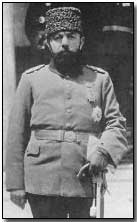Who's Who - Ahmed Djemal Pasha
 Ahmed Djemal Pasha (1872-1922) was one
of the leading members of the Young Turk administration prior to and
throughout
World War One, and one of few initially pro-Entente senior politicians.
Ahmed Djemal Pasha (1872-1922) was one
of the leading members of the Young Turk administration prior to and
throughout
World War One, and one of few initially pro-Entente senior politicians.
Born on 6 May 1872 in Constantinople Djemal signed up to the Committee of Union and Progress - the Young Turk movement - while a staff officer in the Turkish army.
Following the 1908 revolution he was appointed to the consequent military administration. Noted for his ruthlessness in provincial government he was appointed head of security forces in Constantinople and then given the Minister of Public Works portfolio.
During the Balkans Wars of 1912-13 Djemal held numerous senior command positions and in 1913 was appointed to the Cabinet as Minister of Marine.
As one of the more influential Young Turk leaders (along with Enver and Talaat) Djemal's pro-Entente views were notable if unusual. He made diplomatic approaches to the Entente Powers during the July Crisis of 1914 but was rebuffed by the Allies, who were not prepared to endanger Russian co-operation by colluding with the Turkish government.
Snubbed therefore by the Allies Djemal switched his attentions to an alliance with the Central Powers, although he was at first opposed to a full alliance with Germany. He Nevertheless agreed in early October 1914 to use his ministerial powers to authorise Admiral Souchon to launch a pre-emptive strike in the Black Sea.
Holding numerous wartime posts Djemal also served at the head of Fourth Army on the Palestine Front. He further held the military governorship of Ottoman Syria, operating what was in effect a huge personal fiefdom encompassing Palestine and the majority of Arabia.
With the failure of his single attack on the Suez Canal in 1915 Djemal largely avoided taking direct military command, preferring instead to concentrate upon his governorship of Syria. Wielding ruthless control he suppressed an early Arab revolt there, meanwhile persecuting the Armenian minority and refusing permission to successive Fourth Army commanders who wished to withdraw from southern Arabia.
The fall of Jerusalem in December 1917 sent Djemal back to Constantinople where he remained in office until the collapse of the Young Turk administration in October 1918. He subsequently fled Constantinople along with other ministers aboard a German ship.
Djemal thereafter served as liaison officer in talks between the newly-established Soviet Union and the post-war Turkish government. He also spent a brief period acting as a military advisor to Afghanistan before he was killed by Armenian assassins at Tbilisi on 21 July 1922.
A sandbag was a sack filled with earth from which defences were built.
- Did you know?
